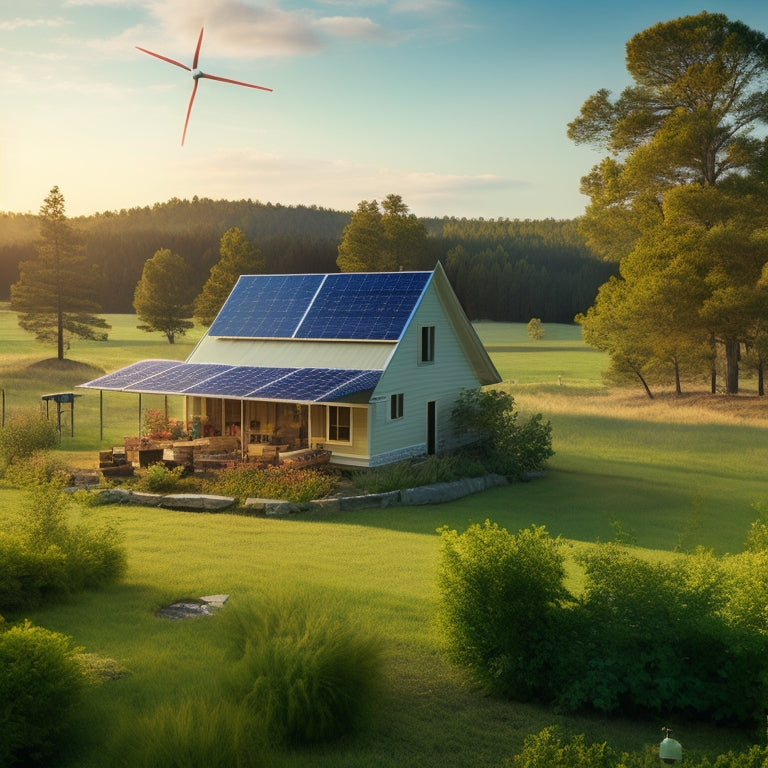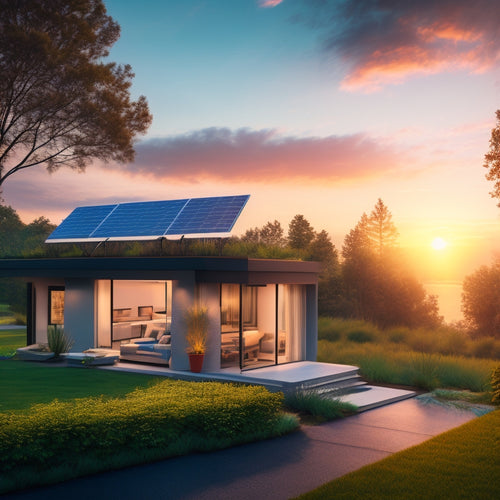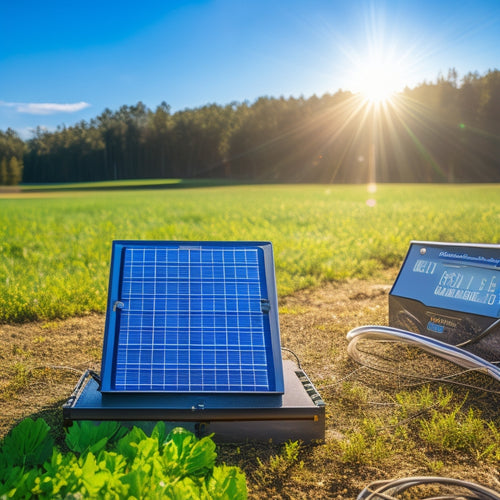
What Fuels Your Air Conditioner Off-Grid?
Share
To fuel your air conditioner off-grid, you'll need a reliable source of power. That's where solar energy comes in, converting sunlight into electrical energy through photovoltaic cells. By sizing your solar panel array correctly, considering factors like panel size, system voltage, and energy demands, you can generate sufficient power to support your air conditioner's needs. High-efficiency solar panels and lithium batteries can optimize energy capture and storage, ensuring a consistent supply of power. With a well-designed system, you'll enjoy energy independence, sustainable living, and lifestyle flexibility - and that's just the beginning of your off-grid cooling experience.
Overview
- Solar power fuels off-grid air conditioners through photovoltaic cells that convert sunlight into electrical energy.
- Accurate sizing of solar panel arrays and battery backup systems is crucial for reliable operation.
- Inverters and charge controllers play critical roles in converting DC power to AC and regulating battery charging.
- Battery selection, maintenance, and monitoring are essential for optimal system performance and energy efficiency.
- Proper system configuration, including panel orientation and inverter type, ensures efficient energy production and consumption.
How Solar Power Works
You're likely familiar with the concept of solar power, but let's investigate deeper into the specifics of how it works.
Solar energy is captured through photovoltaic cells, which convert sunlight into electrical energy through a process of energy conversion. This renewable resource is ideal for off-grid living, as it allows you to generate your own power and reduce your environmental impact.
When selecting a DIY solar power system, consider Key Considerations for DIY Solar Systems such as high-efficiency panels, durable mounting systems, and reliable inverters to guarantee peak performance.
Solar technology has advanced remarkably, making it possible to achieve high energy efficiency and sustainable cooling.
To guarantee peak performance, regular system maintenance is essential, including cleaning your solar panels every 6-12 months to maintain peak performance, as dirty panels can reduce output by up to 25%.
Benefits of Off-Grid Cooling
With the ability to generate your own power through solar energy, off-grid cooling becomes a viable option for those seeking independence from the grid.
You'll enjoy energy efficiency and cost savings by utilizing free energy from the sun. This sustainable living approach reduces your environmental impact, making it an attractive choice for eco-conscious individuals.
Furthermore, off-grid cooling provides lifestyle flexibility, allowing you to live or work in remote areas without relying on traditional power sources.
By adopting off-grid solar battery systems, you can reduce carbon footprint and enhance energy security, especially in rural communities.
Advances in technology have made off-grid cooling more efficient and reliable, with minimal maintenance considerations.
Plus, you can design your off-grid cooling system to blend seamlessly with your surroundings, ensuring a sleek and modern aesthetic.
Solar Panel Requirements
When sizing your solar panel array for off-grid air conditioning, you'll need to take into account two critical factors: panel size and system voltage.
You'll want to verify your panels can generate enough power to support your air conditioner's energy demands, which will depend on the unit's wattage and your desired runtime.
To maximize energy harvest, it's crucial to utilize high-efficiency solutions that can optimize energy capture, especially during low-light conditions.
Panel Size Matters
From the get-go, sizing your solar panel accurately is essential to guaranteeing your off-grid air conditioner operates efficiently.
You'll want to reflect on your energy needs, climate, and solar panel efficiency when determining the ideal panel size. A larger panel doesn't always mean more power, as it depends on the type and quality of the panel.
Accurate energy needs assessment enables customized off-grid solar system design and guarantees a reliable and efficient energy supply peak sun hours.
You'll need to calculate the total wattage required to power your air conditioner, factoring in elements like voltage and current.
When it comes to off-grid energy, every watt counts, and oversizing your panel can be a costly mistake.
System Voltage Counts
Efficiency hinges on the system voltage, a critical aspect of your off-grid solar panel requirements.
You'll need to determine the ideal system voltage for your air conditioner, as it directly impacts energy efficiency. Most off-grid systems operate at 12, 24, or 48 volts.
Lower system voltages, like 12V, are suitable for small systems and short cable runs. However, they can lead to energy losses and reduced efficiency.
Higher system voltages, like 48V, are better suited for larger systems and longer cable runs, as they minimize energy losses and guarantee peak performance.
When selecting a system voltage, consider the type of system you're building, cable lengths, and energy efficiency goals.
Sizing Your Solar Array
You'll need to accurately size your solar array to guarantee it can power your off-grid air conditioner.
To do this, you'll first assess your energy needs, then calculate the total power requirements based on factors like the AC unit's wattage and your desired runtime.
Assess Your Energy Needs
About 90% of the energy consumed by an off-grid air conditioner is dedicated to cooling, which means accurately sizing your solar array is crucial to guarantee you can generate enough power to meet your cooling needs.
You'll need to assess your energy consumption patterns to determine how much power you require. This involves evaluating your air conditioner's cooling efficiency, which is typically measured in British Thermal Units (BTUs).
Consider factors like your desired indoor temperature, the size and insulation of your space, and the number of windows.
Calculate Power Requirements
Across your off-grid property, a critical calculation awaits: determining the power requirements for your solar array to support your air conditioner.
You've assessed your energy needs, now it's time to calculate the peak demand of your air conditioner. Consider factors like energy efficiency, usage patterns, and the unit's wattage rating.
Calculate the total watt-hours required daily, then divide it by the number of peak sun hours your location receives. This will give you the minimum required solar array size.
Make sure you factor in a buffer for unexpected energy demands or reduced sunlight. Accurate calculations will guarantee your solar array can support your air conditioner, providing reliable cooling and energy independence.
Choose Panel Configuration
Your solar array's configuration is critical to meeting your air conditioner's power requirements. A well-designed solar array guarantees you generate enough power to keep your air conditioner running smoothly. When choosing a panel configuration, consider the available space, your energy needs, and the local climate.
| Panel Orientation | Installation Tips |
|---|---|
| South-facing | Ideal for maximum energy production, especially in areas with low shade. |
| West-facing | Suitable for afternoon peak usage, such as when you arrive home from work. |
| Tilted at 30° | Optimizes energy production during peak sun hours (9am-3pm). |
| Shaded areas | Consider using bifacial panels to capture indirect sunlight. |
| Roof-mounted | Verify proper securing and waterproofing to withstand harsh weather conditions. |
Battery Backup Systems
Battery backup systems are an essential component of off-grid air conditioner installations, as they provide a reliable source of power when the grid is unavailable.
You'll need to choose between lithium batteries and lead acid batteries, considering factors like battery lifespan, energy efficiency, and cost comparison.
Lithium batteries are more expensive upfront but offer longer lifetimes and more charging cycles. Lead acid batteries, on the other hand, are more affordable but require more maintenance.
Proper installation tips include ensuring correct battery management and monitoring systems.
Regular maintenance tips, such as keeping your batteries clean and at the right temperature, will also help extend their lifespan.
Inverter and Charge Controller Role
Now that you've selected the right battery backup system for your off-grid air conditioner, it's time to focus on the inverter and charge controller, which play an essential role in converting DC power from your batteries to AC power for your air conditioner.
You'll need to choose the right inverter type, such as a pure sine wave or modified sine wave inverter, depending on your air conditioner's requirements. The charge controller efficiency is also vital, as it guarantees your batteries are charged efficiently and safely.
Look for a charge controller with a high efficiency rating, typically above 95%, to minimize energy losses. By selecting the right inverter and charge controller, you'll guarantee your off-grid air conditioner runs smoothly and efficiently, giving you the freedom to stay cool wherever you are.
Frequently Asked Questions
Can I Use Any Type of Solar Panel for Off-Grid Cooling?
You'll want to choose a high-efficiency solar panel, like monocrystalline or bifacial, to maximize energy output for off-grid cooling, ensuring your AC runs smoothly and efficiently, giving you the freedom to stay cool wherever you roam.
How Long Does It Take to Install an Off-Grid AC System?
Installing an off-grid AC system is like solving a puzzle - it requires precision. You'll spend around 2-5 days on installation, depending on complexity, ensuring ideal off-grid efficiency and a seamless shift to freedom from the grid.
Can I Power Multiple AC Units With One Solar Array?
You can power multiple AC units with one solar array, but it requires precise solar array sizing to ascertain off-grid efficiency, considering factors like unit capacity, insulation, and shading to assure reliable, energy-independent cooling.
Do Off-Grid AC Systems Work During Power Outages at Night?
Like a medieval knight relying on trusty steeds, you'll need energy storage to power your off-grid AC system during nighttime outages, ensuring cooling efficiency and a comfortable refuge from the dark ages of grid dependence.
Can I Use a Generator as a Backup Power Source?
You can employ a generator as a reliable backup power source, choosing from inverter, conventional, or portable types, and selecting suitable fuel options like gasoline, diesel, or propane, to guarantee your off-grid air conditioner runs smoothly during outages.
Ready to Buy
As you flip the switch, the hum of your off-grid air conditioner fills the air, a sweet relief from the scorching heat. But what's behind this magic? The sun's energy, captured by solar panels, is converted into power, stored in batteries, and inverted to fuel your AC. The expedition's not over - you've got to monitor and adjust your system to guarantee seamless performance. Stay tuned, the next chapter in off-grid cooling is about to unfold.
Related Posts
-

Solar Phone Chargers for Camping Essentials
Solar phone chargers are must-haves for your camping essentials, allowing you to stay connected while enjoying nature...
-

The Future of Residential Energy Storage
The future of residential energy storage looks promising and cost-effective for you. With lithium-ion battery prices ...
-

Choosing the Right Solar Power Charge Controller
Choosing the right solar power charge controller is crucial for maximizing energy efficiency and extending battery li...


